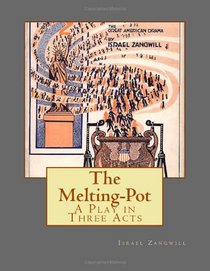Search -
The Melting-Pot: A Play in Three Acts
The MeltingPot A Play in Three Acts
Author:
The Melting Pot is a play by Israel Zangwill, first staged in 1908. It depicts the life of a Russian-Jewish immigrant family, the Quixanos. David Quixano has survived a pogrom, which killed his mother and sister, and he wishes to forget this horrible event. He composes an "American Symphony" and wants to look forward to a society free of ethnic ... more »
Author:
The Melting Pot is a play by Israel Zangwill, first staged in 1908. It depicts the life of a Russian-Jewish immigrant family, the Quixanos. David Quixano has survived a pogrom, which killed his mother and sister, and he wishes to forget this horrible event. He composes an "American Symphony" and wants to look forward to a society free of ethnic ... more »
ISBN-13: 9781480016019
ISBN-10: 1480016012
Publication Date: 9/30/2012
Pages: 116
Rating: ?
ISBN-10: 1480016012
Publication Date: 9/30/2012
Pages: 116
Rating: ?
0 stars, based on 0 rating
Publisher: CreateSpace Independent Publishing Platform
Book Type: Paperback
Members Wishing: 0
Reviews: Amazon | Write a Review
Book Type: Paperback
Members Wishing: 0
Reviews: Amazon | Write a Review
Genres:




